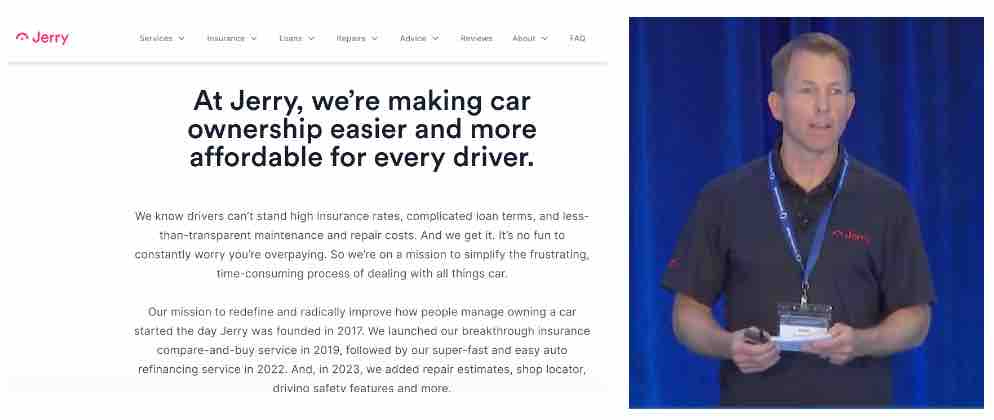GenAI Customer Care Project Now Saving $4M/yr for Car Insurance Firm, Jerry
Customer care transformation at a $450M car services company
This is one of the better case studies that I know of. The GenAI project is already implemented and saving money.
Jerry is a company that aims to help consumers manage everything related to car ownership in one app, including comparing car insurance quotes, finding repair shops and quotes, and reaping savings through safe driving.
Since its inception in 2017, Jerry has experienced rapid growth, expecting to serve its 5 millionth customer by the end of the year. The company is fueled by $110 million in funding, received a $450 million valuation in 2021 and just earned a spot on Forbes’ 2023 Best Startup employers list.
While the company is obviously thrilled about its success, its customer service model began experiencing stress that threatened to disenfranchise some customers.
At our inaugural Generative AI World Conference in Boston last month, Jerry COO John Spottiswood shared how using large language models, the underpinnings of text-to-text generative AI, helped Jerry improve customer response times and save the company.
The problem: Scaling customer service for rapid growth
With a focus on a fully digital and real-time experience, Jerry receives over 200,000 messages a month from more than 100,000 unique users. The high volume meant the company struggled to respond to customer queries within 24 hours, let alone minutes or seconds.
The solution: Deploying an LLM-driven chatbot
Jerry decided to leverage Large Language Models (LLMs) to create a chatbot named "Kelly Bota." The chatbot was designed to handle routine queries, thereby freeing human agents to tackle more complex issues. The technology stack involved using Open AI GPT-4 for complex queries and Open AI GPT-3.5 for initial sorting, integrated via APIs. Messages are captured from chat and SMS through Twilio and stored on Jerry's servers. The chatbot's responses are then sent to Front, a third-party customer service app, and finally to the users.
Execution: A multi-agent system
Jerry developed a multi-agent system where each virtual agent specializes in different subjects. For instance, the "App Screens" agent identifies if a user's issue can be resolved through the mobile app and directs them accordingly. The "Routing" agent decides which agents should handle a particular user request. The system also includes "Payments," "Policy," and "Opt-out" agents, among others.
Jerry employed a JavaScript library called Handlebars to insert data from their database into the chatbot's responses. They also developed a robust testing framework that allows them to evaluate the chatbot's performance both pre-launch and post-launch.
Jerry was able to start the effort in January with just two junior engineers, a project manager, and CTO involvement. They’ve added some talent since but the team remains small.
Impact: Immediate and long-term gains
The results have been spectacular. The chatbot was launched in May, and by June, 100% of inbound messages were responded to within 24 hours, up from just 54% in April. Today, 96% of messages are responded to within 30 seconds. The number of queries requiring human intervention has dropped from 100% to just 11%.
Financially, the chatbot has already achieved a 55% ROI as of August, with an expected 400% ROI and $4 million in annualized savings by year-end.
Keys to success
John says that Jerry's success can be attributed to several factors: a focus on prompt engineering, rapid iteration, investment in testing, and version control. They started small, adding resources only when they saw tangible results.
What's next?
Jerry plans to introduce more specialized agents and is looking to test new LLMs. They also aim to launch a voice agent and implement a lightweight customer feedback system by year-end.
So there you have it—a compelling example of how GenAI can revolutionize customer service.
Our conference videos now available! If you want to see more of the exclusive insights shared at our 2-day Generative AI World conference that featured 50 incredible experts from Harvard Business School, UBS, PwC, Fidelity, Mayo Clinic and more, video recordings are available for individuals who buy a Basic Membership ($89/year). This Basic Member also includes a $100 off the ticket for our conference next fall in Boston - a great ROI.
“Difficulties strengthen the mind, as labor does the body.” - Seneca
Onward,
Paul

